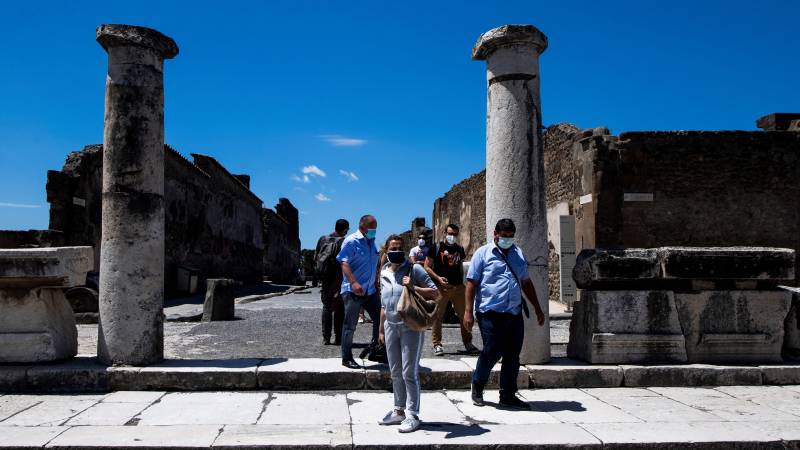Iconic sites reopen as world eyes life after lockdown

Stay tuned with 24 News HD Android App

The Church of the Nativity and the ruins of ancient Pompeii reopened to pilgrims and tourists on Tuesday, as countries further eased coronavirus controls and reopened shuttered economies.
For many nations, including hard-hit Italy and Spain, the summer season will be key to saving what is left of the tourism industry and the latest tentative steps out of lockdown buoyed world markets. But, while now past its peak in Asia and much of Europe, the new coronavirus is continuing its spread. On Tuesday the number of case passed the 5.5 million mark, according to an AFP tally of official sources.
The number of declared cases in the world has doubled in a month and more than one million new cases of COVID-19 have been registered in the last 11 days. More than 346,000 deaths have been recorded worldwide. The virus, and the associated national economic and social lockdowns decreed to halt its spread, have also plunged the world economy into a terrible slump -- and ominous figures and forecasts continue to pile up.
Asian trading hub Singapore warned Tuesday its economy could shrink by as much as seven percent this year. EU leaders, meanwhile, will announce an unprecedented trillion-euro recovery package on Wednesday.
The virus has also had an immense political impact. US President Donald Trump lashed out furiously on Twitter after he was criticised for playing golf over the weekend as the death toll in his country from the coronavirus pandemic neared 100,000. British Prime Minister Boris Johnson's government was in crisis and a minister resigned after top Downing Street aide Dominic Cummings refused to apologise for driving his family across the country despite the lockdown.
Holy birthplace
But there were also signs of hope at some of the world's best known and symbolic destinations.
In Bethlehem, the Church of the Nativity -- built on the spot where Christians believe their saviour Jesus was born -- reopened its doors after more than two months. Once inside, Greek Orthodox Bishop Theophylactos kissed an icon while a priest scattered holy water in the grotto where Jesus is said to have rested in a manger.
Palestinian authorities believe the COVID-19 virus came to Bethlehem with a group of Greek tourists -- and the virus outbreak has devastated the travel industry worldwide. Nevertheless, in Italy -- once the world epicentre of infections after it spread to Europe from China -- the site of a previous natural disaster also reopened to visitors.
The ruins of the Roman city of Pompeii, destroyed by a volcanic eruption in 79 AD and preserved through the centuries in a layer of ash, attracted four million visitors last year. It has now reopened, but foreign visitors are still prohibited from travel to Italy until next month, and locals from the Naples region found the site deserted.
"It's only us guides, and journalists," sighed 48-year-old Valentina Raffone, noting a "sense of emptiness, of sadness" as if after a disaster on the scale of the city's end.
Italian foreign minister Luigi di Maio says he is working with EU colleagues to agree on June 15 as a coordinated day for member states to reopen their borders and tourist regions.
Massive stimulus
"We should save what we can save of the summer, to aid our entrepreneurs," he said.
Beyond tourism, the European Union is attempting to launch an unprecedented trillion-euro economic stimulus to speed the recovery from the pandemic. European Commission president Ursula von der Leyen will unveil her proposal Wednesday, but EU capitals are likely to argue over the details, and a coalition of four "frugal" northern states opposes too generous grants to the hard-hit south.
Elsewhere, Russia on Tuesday recorded its highest daily coronavirus death toll of 174 but said more than 12,000 people had also recovered over the past 24 hours. Health officials said Russia's total death toll from the pandemic had reached 3,807 and its number of cases had hit 362,342, the third-highest number of infections in the world after the United States and Brazil.
And in the Philippines, President Rodrigo Duterte said students will not to go back to school until a coronavirus vaccine is available -- a prospect that may be months or years away.
